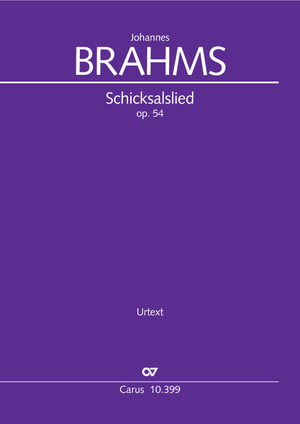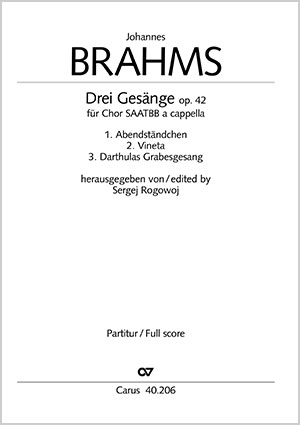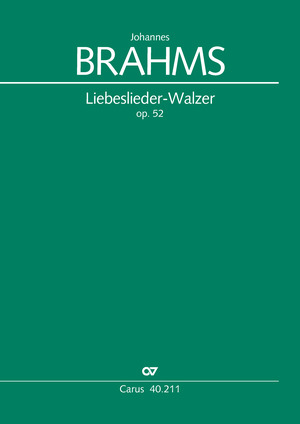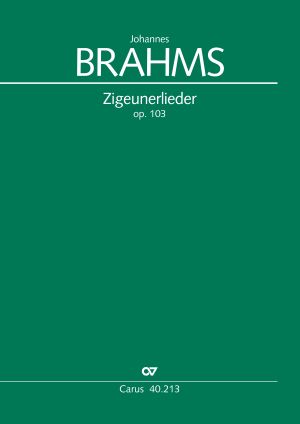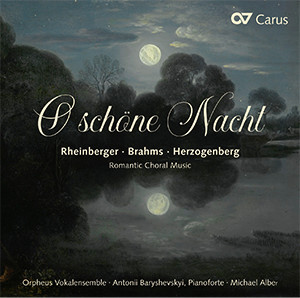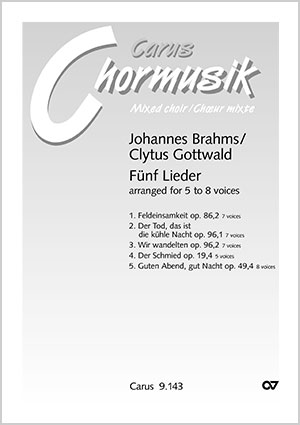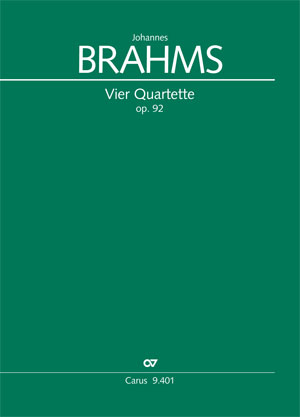
Four Quartets op. 92
1877
Brahms always had a fine feeling for lyrical quality. His cycle Vier Quartette ("Four Quartets") op. 92 for voices and piano, setting four poems by Goethe, Daumer, Allmers, and Hebbel, demonstrates his musical skills in a particularly moving way. The cycle is about the romantic night atmosphere, about melancholy reflections on autumn, and secret noctural amorous adventures.
The Urtext edition from Carus comprises a conductor’s score in large format and a choral score, both underlaid with singing text in German and English, and the piano accompaniment. The cycle can be performed by solo voices and piano, or by four-part mixed choir and piano.
The Urtext edition from Carus comprises a conductor’s score in large format and a choral score, both underlaid with singing text in German and English, and the piano accompaniment. The cycle can be performed by solo voices and piano, or by four-part mixed choir and piano.
Purchase
Additional product information
Contents
-
Composer
Johannes Brahms
| 1833-1897Johannes Brahms' study of musical tradition was of crucial importance to his output: he combined church modes, canonic technique, Baroque style and diction, Bach's counterpoint and Beethoven's thematic-motivic work with the harmonic and expressive achievements of Romanticism to form his own distinctive style. In this respect his choral songs and vocal quartets (e.g. the “Liebeslieder Waltzes” and “New Liebeslieder Waltzes”), often to folk song texts, in which a musical microcosm unfolds, are examplary. His “Deutsches Requiem”, available from Carus in several different versions, constitutes one of the most fascinating confessions of faith in the history of music. Personal details
-
Editor
Uwe Wolf
| 1961Uwe Wolf studied musicology, history, and historical ancillary science at Tübingen and Göttingen. After receiving his doctorate in 1991 he was a research assistant at the Johann-Sebastian-Bach-Institut in Göttingen. From 2004 he worked at the Bach-Archiv Leipzig. There he directed a both research departments, was substantially responsible for the redisigning of the Bach Museum, and he developed the digital Online-Projekt Bach. Since October 2011 he has been the Chief Editor at Carus-Verlag, Stuttgart. He has taught at various universities and also belongs to the editorial boards of several complete editions. Personal details
Frequent questions about this work
 There are no questions and answers available so far or you were unable to find an answer to your specific question about this work? Then click here and send your specific questions to our Customer Services!
There are no questions and answers available so far or you were unable to find an answer to your specific question about this work? Then click here and send your specific questions to our Customer Services!






